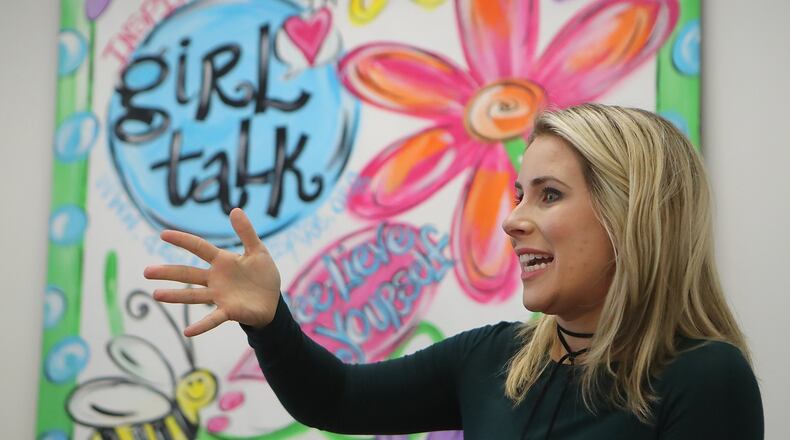More often than not, Haley Kilpatrick came home from middle school with tears in her eyes.
After she endured middle school — three years of not getting invited to birthday parties, sleepovers or even feeling welcome at a table in the cafeteria — it seemed history was doomed to repeat itself.
That was, until she came to a realization: Kilpatrick was not alone. It was not only the biggest revelation of her own life but what would soon be that of thousands of other teenage girls enduring similar hardship.
Fifteen years after founding a nonprofit organization at her high school in Albany, the need and universal appeal remain apparent to this day, with more than 60,000 girls in 400 chapters all over the world.
Headquartered in Atlanta, Girl Talk serves young females, ages 10-18, by offering peer-to-peer guidance and perspective to help navigate the issues of middle school and aiming to inspire girls to develop the confidence to be leaders.
Pairing high schoolers with middle schoolers, Girl Talk started as what Kilpatrick described as a “safe space to be vulnerable and ask questions you may or may not be able to ask your friends … that was the initial idea.” Kilpatrick, now 30, is the oldest of three children in her family. She has a brother, Will, 28, and a sister, Kelly, 27. Her desire to help Kelly when they were younger was part of the inspiration for Girl Talk.
She said that as meetings went on and chapters formed in other places around the state and country, there was “a community service layer that developed as we learned that serving others helps put the (high school and middle school) seasons of your life into perspective … and plants a seed for a lifetime of service.”
It’s ultimately become a leadership program that aims to develop confidence. Kilpatrick said that by year 10 of the program, nearly 80 percent of the middle school girls involved were choosing to become Girl Talk leaders when they got to high school. Girl Talk leaders help by facilitating weekly chapter meetings with middle school students.
“These girls were craving a leadership opportunity that did not have a financial barrier, an academic barrier, or an athletic barrier, and for a lot of girls, one or all of those is a barrier to leadership,” said Kilpatrick, who graduated from Kennesaw State University in 2007 with a bachelor’s degree in communications. “Girl Talk was an opportunity that had no obstacles.”
It held much appeal for many young people, including Kendall Jackson, who started as a Girl Talk leader in ninth grade at Holy Innocents’ Episcopal School in Atlanta and worked as a counselor at Girl Talk’s annual Project Inside Out camp. She is currently a junior at Harvard University.
Jackson said being involved with Girl Talk has “fostered … a desire to serve and give back” as well as helping build self-esteem and confidence and introducing her to a “wonderful community of women who have become mentors and friends.”
Jackson added that she has much love and respect for Kilpatrick.
“As soon as you meet (Kilpatrick), her smile, spirit and heart touches you, just as it touches everyone,” Jackson said. “Her passion and enthusiasm are contagious. She provides practical, tangible ways to serve others.”
When asked about her desire to serve others, Kilpatrick credits her hometown with instilling such values at an early age.
As a fifth-generation Albany native, she’s “proud to be from a great community, which I know gave this dream wings. Had I been from any other town, we might not be having this conversation.”
She described the area of Albany where she grew up as a community where everybody knows their neighbors.
“Albany was a unique place to live, in that people knew if something was going on or needed to be brought to one’s attention,” Kilpatrick said. “If there was a neighbor who was sick, we would ask one another how we could help … I miss that part — the strong sense of community.”
Moving to the city (Atlanta), she said, though, was something she’d “always aspired to do” and it would come to be the worldwide headquarters for Girl Talk. (Her parents, Bert and Tonya Kilpatrick, now live in Santa Rosa Beach, Fla.)
Looking back on 15 years, she is happy for how far the organization has come and hopes it will continue helping girls for many generations to come who have ever felt social pressures or the exclusivity of middle and high school cliques.
“The way we feel at this young age and what we see, it may sound trivial, but for a middle school girl, it is anything but,” Kilpatrick said. “Realizing that I was not the only one, and understanding that at some point all girls felt this way … that was the big aha moment for Girl Talk.”
Added Kilpatrick: “There’s something very magical — a real, authentic sisterhood — that comes from these girls being able to be vulnerable and serve together and learn the power of girls supporting girls. And that, I believe, is what sets Girl Talk apart and is a big part of our success.”
Those interested in donating or starting a Girl Talk chapter at a local middle school can visit the organization's website, www.mygirltalk.org, for details.
About the Author
Keep Reading
The Latest
Featured




